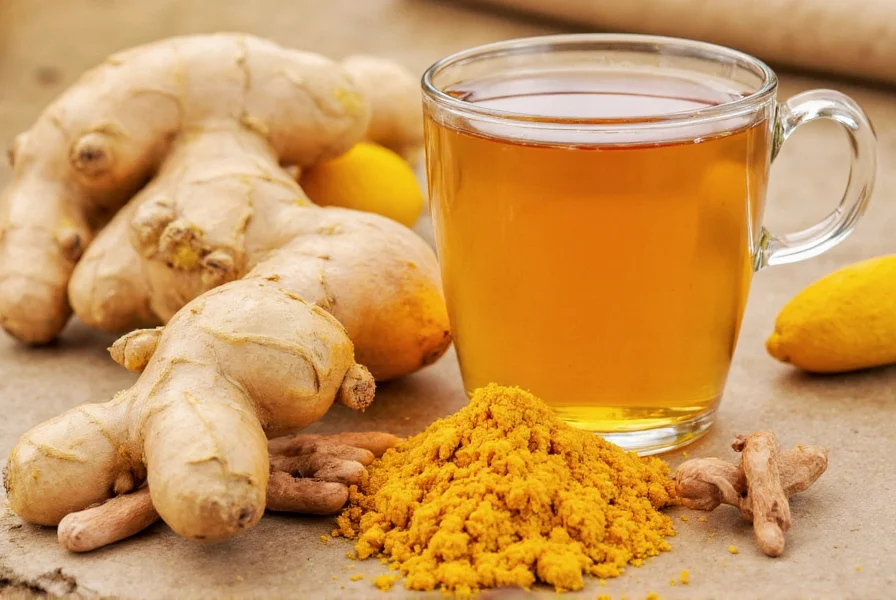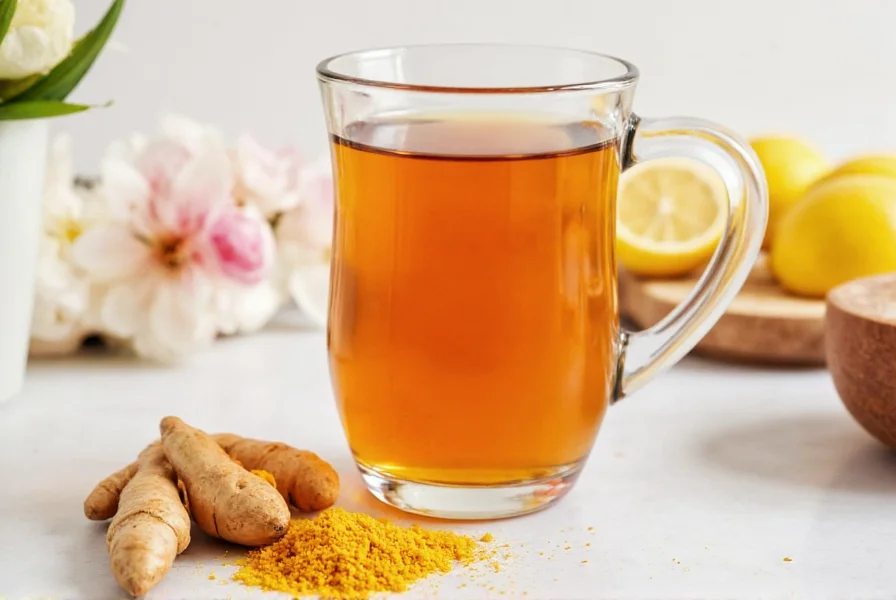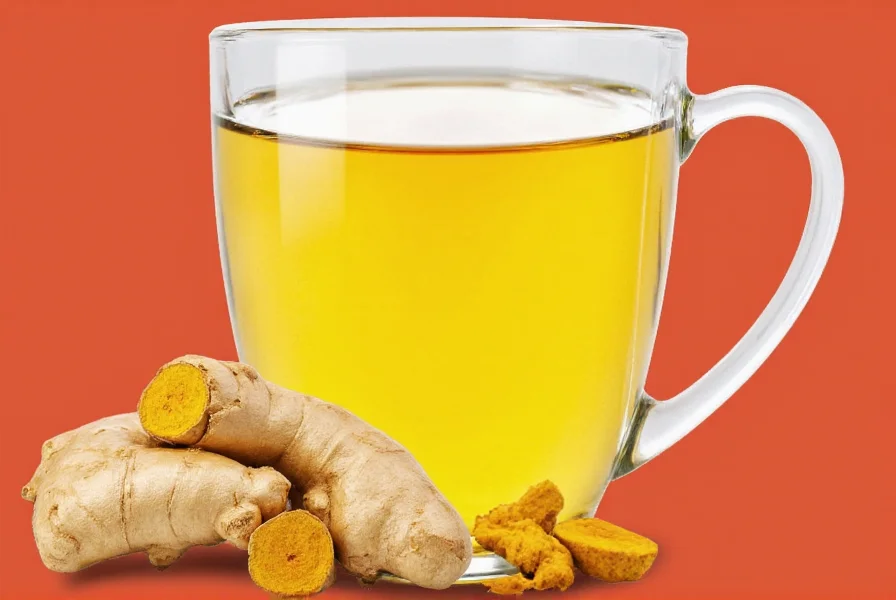For centuries, traditional medicine systems have utilized ginger and turmeric as powerful healing agents. Modern science now validates many of these traditional uses, revealing how a simple cup of ginger and turmeric tea delivers measurable health advantages. This dynamic duo works through complementary biological pathways that enhance each other's effectiveness beyond what either could achieve alone.
The Science Behind Ginger's Healing Properties
Ginger root contains bioactive compounds called gingerols that demonstrate significant anti-inflammatory and antioxidant activity. Clinical research shows ginger effectively reduces nausea associated with pregnancy, chemotherapy, and motion sickness. A comprehensive review published in Nutrients journal confirmed ginger's ability to alleviate muscle pain and reduce markers of inflammation after exercise. Regular consumption of ginger tea supports digestive health by accelerating gastric emptying and reducing symptoms of indigestion.
Turmeric's Potent Curcumin Compound
Turmeric's primary active component, curcumin, gives this golden spice its remarkable medicinal properties. Studies in the Journal of Medicinal Food demonstrate curcumin's ability to inhibit multiple inflammation pathways simultaneously, making it particularly valuable for managing chronic inflammatory conditions. However, curcumin has low bioavailability on its own. When combined with black pepper (containing piperine) or consumed in warm liquid like tea, absorption increases significantly—up to 2000% according to research from Planta Medica.
| Benefit | Ginger Contribution | Turmeric Contribution | Synergistic Effect |
|---|---|---|---|
| Anti-inflammatory | Inhibits COX-2 enzyme | Blocks NF-kB pathway | Comprehensive inflammation reduction |
| Antioxidant | Neutralizes free radicals | Boosts antioxidant enzymes | Enhanced cellular protection |
| Digestive Health | Stimulates digestion | Supports liver function | Improved nutrient absorption |
| Pain Relief | Reduces muscle soreness | Alleviates joint pain | Broader pain management |
Synergistic Benefits of the Combination
When combined in tea form, ginger and turmeric create a powerful synergy that enhances their individual benefits. The warming properties of ginger improve circulation, helping distribute turmeric's compounds more effectively throughout the body. Research published in Food & Function indicates that gingerols and curcumin work through complementary mechanisms that provide more comprehensive anti-inflammatory effects than either compound alone. This combination also supports metabolic health by improving insulin sensitivity and reducing oxidative stress markers.

Optimal Preparation Methods
To maximize the health benefits of ginger and turmeric tea, proper preparation matters significantly. Fresh roots provide higher concentrations of active compounds than powdered forms. For optimal curcumin absorption, add a pinch of black pepper and a small amount of healthy fat like coconut oil to your tea. Simmer fresh ginger slices and turmeric chunks in water for 10-15 minutes to extract maximum compounds. Avoid boiling for extended periods as this can degrade some beneficial compounds.
Scientific Evidence and Limitations
While laboratory and animal studies show impressive results for both ginger and turmeric, human clinical trials present a more nuanced picture. A systematic review in Advances in Nutrition concluded that while evidence supports ginger's effectiveness for nausea and turmeric's anti-inflammatory properties, many studies use concentrated extracts rather than tea preparations. The concentration of active compounds in homemade tea is typically lower than in clinical studies using standardized extracts. Most research indicates benefits accumulate with regular, long-term consumption rather than providing immediate dramatic effects.
Potential Side Effects and Considerations
Ginger and turmeric tea is generally safe for most people when consumed in culinary amounts. However, certain individuals should exercise caution. Those taking blood thinners should consult their physician before regular consumption, as both ingredients have mild anticoagulant properties. People with gallstones should be cautious with turmeric as it may stimulate bile production. Ginger in large quantities may cause heartburn in sensitive individuals. Pregnant women can typically enjoy moderate amounts of ginger tea for nausea relief but should consult their healthcare provider regarding turmeric consumption.

Integrating Into Your Wellness Routine
For maximum benefit, incorporate ginger and turmeric tea into your daily routine consistently. Morning consumption can support digestion throughout the day, while evening tea may promote relaxation and reduce next-day muscle soreness. Start with small amounts (½ inch of each root per cup) and gradually increase as your body adjusts. Pairing this tea with meals containing healthy fats enhances absorption of the fat-soluble compounds. Remember that while this tea offers valuable health support, it works best as part of a comprehensive approach to wellness including balanced nutrition and regular physical activity.
How often should I drink ginger and turmeric tea for optimal benefits?
For general wellness, consuming ginger and turmeric tea 1-2 times daily provides optimal benefits. Research suggests consistent daily consumption yields better results than occasional use. Many studies showing positive effects used equivalent amounts of 1-2 cups per day. However, individual tolerance varies, so start with smaller amounts and gradually increase as your body adjusts.
Can ginger and turmeric tea help with weight loss?
While ginger and turmeric tea isn't a weight loss solution by itself, it can support metabolic health as part of a comprehensive approach. Studies indicate these spices may modestly increase thermogenesis and improve insulin sensitivity. A clinical trial in the Evidence-Based Complementary and Alternative Medicine journal found participants who consumed ginger regularly experienced modest reductions in body weight and waist-to-hip ratio compared to control groups. The tea works best when combined with balanced nutrition and regular exercise.
What's the best time of day to drink ginger and turmeric tea?
Morning consumption supports digestion throughout the day and provides natural energy without caffeine. Some people prefer evening tea for its potential relaxation benefits and to reduce next-day muscle soreness. Those using it for nausea relief should drink it when symptoms occur. For maximum anti-inflammatory effects, spreading consumption throughout the day (morning and afternoon) may be most beneficial based on the compounds' metabolic half-lives.
How long does it take to experience benefits from ginger and turmeric tea?
Some effects like nausea relief may occur within 30-60 minutes of consumption. However, most research indicates that consistent daily consumption for 4-8 weeks is needed to experience significant anti-inflammatory and metabolic benefits. A study in the Journal of Medicinal Food found measurable reductions in inflammatory markers after 6 weeks of daily ginger consumption. Individual results vary based on health status, dosage, and consistency of use.
Can I use powdered ginger and turmeric instead of fresh roots?
Yes, powdered forms work effectively though fresh roots generally contain higher concentrations of active compounds. Use ¼ teaspoon of powdered ginger or turmeric to substitute for 1 inch of fresh root. To enhance absorption of curcumin in powdered turmeric, always combine with black pepper and a small amount of healthy fat. High-quality organic powders stored in airtight containers maintain potency for several months.











 浙公网安备
33010002000092号
浙公网安备
33010002000092号 浙B2-20120091-4
浙B2-20120091-4